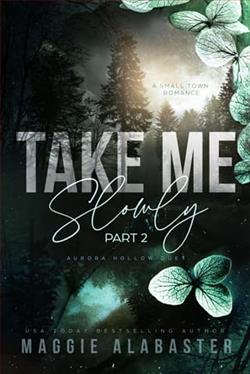Page 8 of Little Girls Sleeping
If only she had stayed with her and not made a plan to meet her later.
If only…
An immense sadness filled her. The onlysolace was that there was closure in Jenny’s case, but there was no comfort in someone’s life ending before it ever really began. She remembered that Jenny had told her that she wanted to be a nurse, so that she could help people. She wondered what Chelsea had wanted to be when she grew up. Losing a child and not knowing what had happened to her must be a lifetime of heartbreak for any parent.
She focused her attention on the cold case. The notes and interviews seemed inconclusive. Katie wasn’t an investigator—she had only worked minimal investigative cases on patrol—and yet there were things that stood out to her. The witness interviews appeared rushed and incomplete. There were a couple of people the detective hadn’t followed up on, though it was possible the notes were filed somewhere else.
When Katie’s parents had told her that Jenny had died, she had immediately demanded how and why. At first, she didn’t believe it. It was too horrible. Her parents tried to be gentle, not wanting to upset her more than necessary, but Katie knew there was more to the story. She didn’t rest until she found a newspaper, searching without her parents’ consent, and finally finding a copy in the neighbor’s recycling pile. And there it was, the grisly and shocking truth of what had happened. She remembered every word after the startling headline as her hands trembled and she cried for her friend.
Local Pine Valley Girl Caught in Middle of Custody Battle Turned Deadly.
The article went on to describe how Mr. Daniels had shot and killed his ex-wife in their home and then gone to find Jenny at the camp, making up an emergency to lure her to her death just under a mile away.
Jenny’s smiling face came to Katie’s mind again as she thought about how senseless her murder was. She felt that they would still have been friends today and would have had so much in common. Instead, a wonderful person had been taken from the world.That fact chilled her deeply, and had been one of the reasons she became a police officer.
She made a swift decision. There was a small copy machine in her uncle’s office, so she photocopied the entire file, slid the copies into a plain unmarked folder, then returned the official documents to the original file.
“How are you doing?” asked Denise as she poked her head into the sheriff’s office.
“Great. I found more files to return.” Katie straightened the pile of folders in her hands.
“There’realwaysfiles to return. I have dreams about files coming at me in endless waves,” Denise laughed. “I managed to find more data entry for you. I left it at your workstation.”
“Thanks, Denise.”
As the other woman turned to leave, Katie called after her, trying to sound casual.
“Does Detective Rory Templeton still work here?”
“Yes. He’s over in the detective division. Why?”
“Just curious. I’ve heard from my uncle about some of the interesting cases he’s worked.”
“If you want to go over there, there’s an assistant, Kelli, who buzzes everyone in. Tell her I said it was okay.”
“Thanks.”
“Let me know if you need anything,” Denise said, and was gone.
It was against protocol to remove any information from an investigation, open or closed, but Katie would come clean to her uncle if she found anything useful—if not, she would destroy her copies. She had to make sure there was nothing more that could be done on the case. She hadn’t been able to save Jenny, but she might be able to help Chelsea.
Four
The painting hung in the corner, overpowering the entire exhibition with its dark contrast and dramatic hues. The abstract scene wasn’t anything in particular at first glance, but it made a lasting impression due to its use of color and shape. The heavy brushstrokes in crimson and deep arctic blue washed across the canvas with great flair, with black lines accentuating the picture both horizontally and vertically.
Katie stood studying the work, searching for the artist’s motivation or some kind of story. She wondered what it was they were trying to capture. The simplest answer would be darkness, misunderstanding, or loneliness. The painting was mesmerizing and appeared to change subtly every time she looked at it.
She glanced at her watch. Her uncle was already fifteen minutes late. She decided to slowly peruse the gallery rather than wait any longer, and took several moments at each exhibit before moving on. There were oil paintings, watercolors, bronzes, a sculpture made of recycled items, and photography. Every piece made her relax and enjoy the moment. Ever since she was a little girl, she had loved looking at paintings, photographs, and any type of artistic exhibits. She shared this interest with her uncle, and that was one of their strongest bonds—before the law-enforcement bug hit her too.
She found herself drawn back to a series of black-and-white photographs from 1950 depicting everyday scenes of people interacting with one another in the streets and at home. It gave her pause. It was well before her time, and so many things had changed. She wondered what people from that era thought about the changes in technology, crime, and social identity. Life then had been so simple.
“Makes you think,” said a voice behind her.
Katie turned and smiled at her uncle. “Yes, it really does.”
The sheriff was dressed casually in jeans and a dark long-sleeved shirt. His eyes had a cool blue stare that could waver between calm and loving and an intensity that made many criminals confess.
“You know, I remember when your favorite types of paintings had ponies, rabbits, and raccoons in them,” he laughed.















